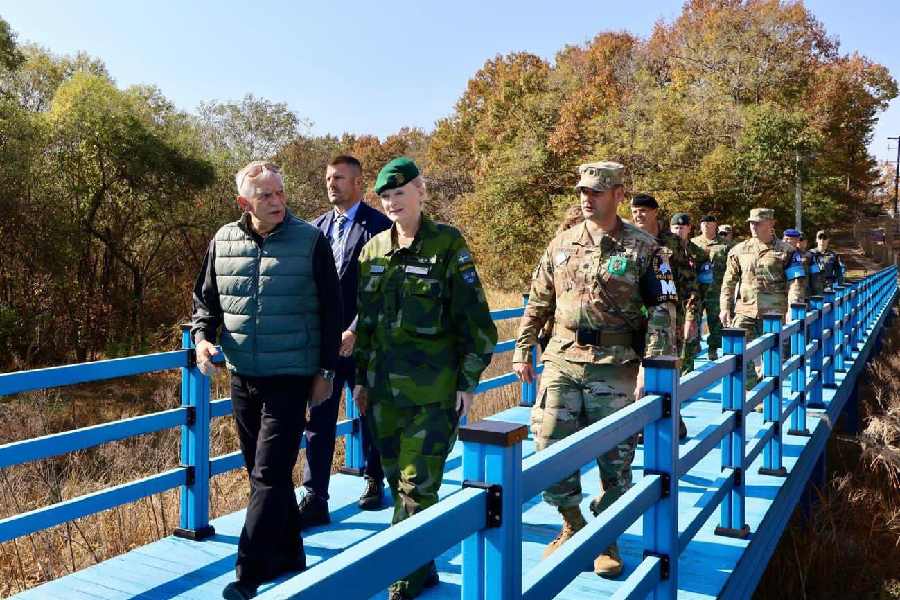North Korea on Tuesday fired multiple short-range ballistic missiles toward its eastern sea, the South Korean military said, as the country continued its weapons demonstrations hours before the US presidential election.
South Korea's Joint Chiefs of Staff didn't immediately specify the number of missiles detected or how far they flew. Japan's Defence Ministry said the missiles were believed to have already landed at sea and there were no immediate reports of damage.
The launches came days after North Korean leader Kim Jong Un supervised a flight test of the country's newest intercontinental ballistic missile designed to reach the US mainland.
In response to that launch, the United States flew a long-range B-1B bomber in a trilateral drill with South Korea and Japan on Sunday in a show of force. That drew condemnation from Kim's powerful sister, who on Tuesday accused North Korea's rivals of raising tensions with “aggressive and adventuristic military threats.”
South Korean officials have said that North Korea was likely to dial up its military displays around the US presidential election to command the attention of Washington. South Korea's military intelligence agency said last week that North Korea has also likely completed preparations for its seventh nuclear test.
Outside officials and analysts say North Korea eventually hopes to use an expanded nuclear arsenal as leverage to win concessions such as sanctions relief after a new US president is elected.
There are widespread views that Kim would prefer a win by Republican candidate Donald Trump, with whom he engaged in high-stakes nuclear diplomacy in 2018-19, seeing him as a more likely counterpart to give him what he wants than Democratic candidate Kamala Harris.
During campaigning, Trump boasted about his personal ties with Kim, while Harris said she won't “cozy up to tyrants and dictators like Kim Jong Un who are rooting for Trump.”
North Korean state media claimed last week that the Hwasong-19 it tested on October 31 was “the world's strongest” ICBM, but experts say the solid-fuel missile was too big to be useful in a war situation.
Experts say North Korea has yet to acquire some critical technologies to build a functioning ICBM, such as ensuring that the warhead survives the harsh conditions of atmospheric re-entry.
Tensions between the Koreas are at their highest point in years as Kim has repeatedly flaunted his expanding nuclear weapon and missile programmes, while reportedly providing Russia with munitions and troops to support President Vladimir Putin's war in Ukraine.
According to the US, South Korean and Ukrainian intelligence assessments, North Korea is estimated to have sent between 10,000 and 12,000 troops to Russia. If they start fighting against Ukraine forces, it would mark North Korea's first participation in a large-scale conflict since the end of the 1950-53 Korean War.
On Monday, US State Department spokesperson Matthew Miller told reporters that as many as 10,000 North Korean soldiers were in Russia's Kursk region near Ukraine's border and preparing to join Moscow's fight against Ukraine in the coming days. That's up from the 8,000 troops that the US government mentioned Thursday.
After a meeting in Seoul on Monday, South Korean Foreign Minister Cho Tae-yul and EU foreign policy chief Josep Borrell expressed “deep concern” over the possibility that Russia might transfer nuclear or ballistic missile-related technology to the North in exchange for its arms and military personnel.
Such transfers would “jeopardize the international non-proliferation efforts and threaten peace and stability on the Korean Peninsula and across the globe,” they said, while calling on North Korea and Russia to immediately withdraw the North's troops from Russia.
In response to North Korea's growing nuclear threat, South Korea, the United States and Japan have been expanding their combined military exercises and updating their nuclear deterrence plans built around US strategic assets.
North Korea has portrayed the joint military drills by its rivals as rehearsals for an invasion and used them to justify its relentless pursuit of nuclear weapons and missiles.
At a UN Security Council meeting Monday, North Korea's ambassador, Kim Song, defended the North's nuclear and ICBM programmes as essential for the country's self-defence and a necessary response to what it perceives as nuclear threats from the United States. He stressed that North Korea would accelerate the build-up of “our nuclear force that can counter any threat presented by hostile nuclear weapon states.”
US Deputy Ambassador Robert Wood warned that the US cannot stand back from North Korea's expanding nuclear and ballistic missile programs and the growing threat to US security “without a response.”
Wood also repeated last week's call for Russia to say whether there are North Korean troops on the ground in Russia. “We're not in a court here,” Russian Deputy Ambassador Anna Evstigneeva replied, “and the questions of the United States, in the spirit of an interrogation, is not something I intend to answer.”












